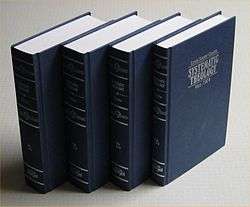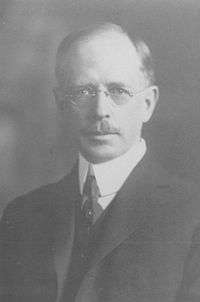Lewis Sperry Chafer
| Lewis Sperry Chafer | |
|---|---|
|
Dr. Chafer, circa 1929. | |
| Born |
February 27, 1871 Rock Creek, Ohio, U.S. |
| Died |
August 22, 1952 (aged 81) Seattle, Washington, U.S. |
| Occupation | Theologian, Author |
| Spouse(s) | Ella Loraine Case (1896–1944) |
| Parent(s) |
Thomas Chafer Lomira Chafer |
Lewis Sperry Chafer (February 27, 1871 – August 22, 1952) was an American theologian. He founded and served as the first president of Dallas Theological Seminary, and was an influential proponent of Christian Dispensationalism in the early 20th century.
Biography
Early life
Chafer was born in Rock Creek, Ohio to Thomas and Lomira Chafer and was the second of three children. His father, a parson, died from tuberculosis when Lewis was 11 years old, and his mother supported the family by teaching school and keeping boarders in the family home. Chafer attended the Rock Creek Public School as a young boy, and the New Lyme Institution in New Lyme, Ohio from 1885 to 1888. Here he discovered a talent for music and choir.
Chafer quit his studies at Oberlin to work with YMCA evangelist, Arthur T. Reed of Ohio. [1] From 1889 to 1891, Chafer attended Oberlin College, where he met Ella Loraine Case. They were married April 22, 1896 and formed a traveling evangelistic music ministry, he singing or preaching and she playing the organ. Their marriage lasted until she died in 1944.
Ministry
Ordained in 1900 by a Council of Congregational Ministers in the First Congregational Church in Buffalo and in 1903 he ministered as an evangelist in the Presbytery of Troy in Massachusetts and became associated with the ministry of Cyrus Scofield, who became his mentor.
During this early period, Chafer began writing and developing his theology. He taught Bible classes and music at the Mount Hermon School for Boys from 1906 to 1910. He joined the Orange Presbytery in 1912 due to the increasing influence of his ministry in the south. He aided Scofield in establishing the Philadelphia School of the Bible in 1913. From 1923 to 1925, he served as general secretary of the Central American Mission.
When Scofield died in 1921, Chafer moved to Dallas, Texas to pastor the First Congregational Church of Dallas where Scofield had ministered. Then, in 1924, Chafer and his friend William Henry Griffith Thomas realized their vision of a simple, Bible‐teaching theological seminary and founded Dallas Theological Seminary (originally Evangelical Theological College). Chafer served as president of the seminary and professor of Systematic Theology from 1924 until his death. He died with friends while away at a conference in Seattle, Washington in August 1952.
In 1953, the newly‐built chapel was designated the Lewis Sperry Chafer Chapel after the recently passed leader.[2]
During his life, Chafer received three honorary doctorates: Doctor of Divinity from Wheaton in 1926, Doctor of Letters from Dallas in 1942, and Doctor of Theology from the Aix‐en‐Province, France, Protestant Seminary in 1946.[3]
Chafer had a tremendous influence on the evangelical movement. Among his students were Jim Rayburn, founder of Young Life (as well as many of Young Life's first staff members), Kenneth N. Taylor, author of The Living Bible translation, and numerous future Christian educators and pastors, including Howard Hendricks, J. Dwight Pentecost, Charles Caldwell Ryrie, J. Vernon McGee, and John Walvoord, who succeeded him as president of DTS.
Personality
Chafer was recognized among his friends and peers for his balanced, simple life. He was a well‐spoken and relaxed leader and was not a fire and brimstone preacher. Chafer believed the basic truths for Christian living are found in Romans 5, a chapter which teaches about peace, Grace, weakness, hope, sacrifice, love, and joy.[4]
In recognition of this, Dallas Theological Seminary offers a commencement award, the Lewis Sperry Chafer Award, every year to the graduating master's student who: "in the judgment of the faculty because of his well‐balanced Christian character, scholarship, and spiritual leadership, best embodies and portrays the ideals of Dallas Theological Seminary." An additional award, the Lorrain Chafer Award, is awarded to the graduating international master's student who: "in the judgment of the faculty, best evidences well‐balanced Christian character, scholarship, and spiritual leadership."[5]
The Dallas Seminary Foundation has also set up a charitable giving program called the Lewis Sperry Chafer Legacy, recognizing the graciousness in Chafer's life.[6]
Theology
Chafer is widely recognized as one of the founders of modern Dispensationalism[7][8][9][10][11] and was vehemently opposed to covenant theology.[12] He was a premillennial, pretribulational dispensationalist. His overall theology could be generally described as based on the inductive study of the entire Bible, having similarities to John Nelson Darby of the Plymouth Brethren, Calvinism, a mild form of Keswick Theology on Sanctification, and Presbyterianism, all of these tempered with a focus on spirituality based on simple Bible study and living.
Chafer's theology has been the subject of much study and debate in and out of the theological community since his death,[13][14][15] especially on the two larger topics of dispensationalism and Christian Zionism,[16] specifically that the Jews are a people called unto God with a separate historical purpose and plan from the Church.
Writings

In 1933, Dallas acquired the periodical Bibliotheca Sacra and began publishing it in 1934. Chafer wrote about 70 articles for this journal (see external links below).
In 1947, after ten years of work, he completed his Systematic Theology in eight volumes. This was the first time that a premillennial, dispensational framework of Christian theology had been systematized into a single format. The books were so popular that it sold out the first printing in six months and needed a third printing within two years.[17] The series has been printed many times since by a number of publishing houses.
Chafer's Systematic Theology is a standard dispensational systematic theology at Dallas Theological Seminary. Lewis Sperry Chafer wrote, "These pages represent what has been, and is, taught in the classrooms of the Dallas Theological Seminary".[18] It has been claimed that "This is the definitive work to use in understanding what Dispensationalism teaches and believes. If you are going to use “straw men” to defeat dispensational theorists, make sure your scarecrow favors Lewis Sperry Chafer."[19]
Selected publications
Many of Chafer's books have been reprinted multiple times by several different publishing houses. Some of these include:
- The Kingdom in History and Prophecy, 1915.
- Salvation: A Clear Doctrinal Analysis, 1917. Reprint, 1955. ISBN 0-310-22351-2
- He That is Spiritual, 1918. Reprint, 1967. ISBN 0-310-22341-5
- True Evangelism: Winning Souls by Prayer, 1919. Reprint, 1978. ISBN 0-310-22381-4
- Satan: His Motive and Methods, 1919. Reprint, 1964. ISBN 0-310-22361-X
- Must We Dismiss the Millennium? 1921
- Grace: The Glorious Theme, 1922. Reprint, 1950. ISBN 0-310-22331-8
- Major Bible Themes, 1926. Reprint, 1974. ISBN 0-310-22390-3
- The Epistle to the Ephesians, 1935. Reprint, 1991. ISBN 0825423422
- Systematic Theology, 1947. Reprint, 1993. ISBN 0-8254-2340-6
His Systematic Theology includes practically word-for-word, some of his other works.
References
- ↑ Hannah, John D. "Lewis Sperry Chafer" American National Biography. New York: Oxford University Press, 1999. vol. 4, p. 619. ISBN 0195127838.
- ↑ Dallas Theological Seminary The Handbook of Texas, Online.
- ↑ George G. Houghton, "Lewis Sperry Chafer, 1871-1952", Bibliotheca Sacra 128:512 (Oct 1971), p. 298. Houghton (note 23) credits Rudolph A. Renfer, “A History of Dallas Theological Seminary” (unpublished Ph.D. dissertation, University of Texas, Austin, TX, 1959), pp. 108-109.
- ↑ To Reign in Life by Ray Stedman. 1962.
- ↑ Commencement Awards Dallas Theological Seminary. Retrieved May 6, 2007.
- ↑ Lewis Sperry Chafer Legacy Charitable giving program of the Dallas Seminary Foundation.
- ↑ The Obituary of Dispensationalism: 1830–1988 by Vic Reasoner.
- ↑ History of Dispensationalism Pembroke Bible Chapel.
- ↑ The Calvinistic Heritage of Dispensationalism by Thomas Ice.
- ↑ What is Dispensationalism? by Michael J. Vlach, Ph.D.
- ↑ Changing Patterns in American Dispensational Theology by Craig A. Blaising, Wesley Center for Applied Theology.
- ↑ Dr. Chafer on Covenant Theology by Miles J. Stanford.
- ↑ The Theological Method of Lewis Sperry Chafer. Journal of Ministry and Theology, vol 5 no 1.
- ↑ Lewis Sperry Chafer and the Development of Interdenominational Fundamentalism in the South, 1900–1950 American Historical Association dissertation by B. Dwain Waldrep.
- ↑ Dr. Lewis Sperry Chafer by Miles J. Stanford.
- ↑ Christian Zionism: Dispensationalism And The Roots Of Sectarian Theology by Stephen Sizer. December 12, 2000.
- ↑ Celebrating 80 Years: Highlights from the History of Dallas Theological Seminary, 1924–2004 Dallas Theological Seminary exhibit, 2005.
- ↑ Lewis Sperry Chafer: Systematic Theology, Volume I, preface, p. xxxviii.
- ↑ Thomason, Dr. David. "Chafer's Systematic Theology Review". Retrieved 2011-10-03.
External links
Biographical
- Celebrating 80 Years: Highlights from the History of Dallas Theological Seminary, 1924-2004 Dallas Theological Seminary exhibit, 2005.
Chafer material online
- Works by Lewis Sperry Chafer at Project Gutenberg
- Works by or about Lewis Sperry Chafer at Internet Archive
- Lewis Sperry Chafer written lectures and readable books online.
- The Fundamentals of Grace by Lewis Sperry Chafer. Journal of the Grace Evangelical Society, Autumn 1994.
- The Terms of Salvation by Lewis Sperry Chafer. Journal of the Grace Evangelical Society, Autumn 1988.
- The Church Which Is His Body by Lewis Sperry Chafer. Excerpt from The Kingdom in History and Prophecy, 1915.
- Lewis Sperry Chafer links to various writings.
